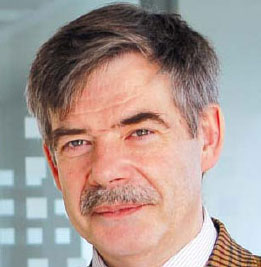Foreign and Military Affairs
EU seeks better understanding of China
By David Bartram (China Daily European Weekly)
Updated: 2011-04-29 10:50
 |
Large Medium Small |
"The work we are doing is starting to attract more people's attention. We are getting more media exposure, publishing articles in newspapers like the Financial Times and the Independent. We are also attracting large numbers of students to our degree programs. We have lots of UK and EU students being trained not only to speak excellent Mandarin but also learning to understand China more generally. They are already going on to become young researchers on China.
"Of course this is just the beginning of a long journey. As China has become the second-largest economy in the world, there will be more and more people wanting to know about China and engage with it. People have to learn and they have to learn quickly if they want to enjoy the benefits of China's rise."
This process is not going to occur overnight. While Europe's think tanks and research institutes may be producing more information on China and educating a greater number of people on contemporary issues, it is harder to quantify how this is influencing the EU's approach to its relationship with China.
|
 Gustaaf Geeraerts, founder of the Brussels Institute of Contemporary China Studies. [Photos Provided to China Daily]
|
"There is still a clear divide between member state's China policies," says Parello-Plesner at the ECFR. Their 2009 report criticized Europe for allowing China to exploit divisions between EU members.
"Generally China will get free-traders in the north like the Netherlands, the UK and Denmark to block moves it sees as too strong, while relying on the southern European countries to dilute policies on human rights."
Parello-Plesner points to David Cameron's trip to China last year, as well as Hu Jintao's visit to Paris, as evidence that bilateralism is still the norm when it comes to Europe's relationship with China. Whether the EU's member states will heed the warning from Brussels is another matter. Growing interest and understanding of China will not be enough to forge a united China voice across Europe; many individual countries will have to sacrifice favorable bilateral agreements for a common standpoint to hold.
With this firmly in mind, the ECFR strives to take the China issue across Europe. While research and debate on China has converged on Brussels over the last few years, Parello-Plesner argues that a united approach must be a pan-European one. The ECFR's work on China spreads across the continent, in offices from Madrid to Berlin to Sofia.
On top of the work being done across the UK, other EU member states are also redoubling their efforts. In Germany, the federal government is increasingly funding research projects looking at the relationship between Europe, China and Asia as a whole.
"Our project is part of a huge initiative by the German federal government called the excellence initiative. We receive 6.5 million euros a year to do research for five years," says Barbara Mittler of the Institute of Chinese Studies at the University of Heidelberg. Given the structure of Germany's university system, the approach is different to that of say, the UK or France, where China policy research has gravitated more organically around centers of excellence.
"Germany doesn't have a system of elite universities in the way the US or the UK does. It was always very egalitarian, but now the government is saying it is better to sponsor some places more than others and put money wherever the good research is."
This state subsidized approach can help support research into niche areas of Chinese studies. The greater challenge is feeding this research into the EU-China relationship.
"It can be difficult to see how research relates to policymaking," Mittler says.
"But for example, many of us are involved in rewriting histories of the 'cultural revolution' (1966-1976). There are moments in time that are usually simplified by the media or politicians to such an extent it can create intercultural misunderstanding. We try to take part in roundtable discussions with politicians and policymakers in order to bring our 'scholarly' ideas to them."